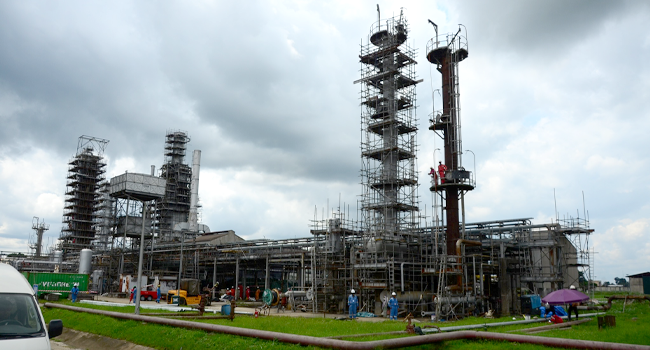The Nigerian National Petroleum Corporation Limited (NNPCL) has formally invited former President Olusegun Obasanjo to visit the Port Harcourt Refinery to personally assess its operational status, following a wave of criticism from the elder statesman. This invitation comes after Obasanjo’s recent television interview, where he cast doubt on the effectiveness of the country’s refineries, particularly the Port Harcourt plant, which has been the subject of much debate over the years.
Obasanjo, in an interview with Channels Television, alleged that his discussions with officials from Shell Petroleum Development Company (SPDC) raised serious concerns about the refinery’s viability. According to him, SPDC, which had been approached for potential investment, expressed reservations about the pervasive corruption hindering the refinery’s potential. The former president further accused the NNPCL of misleading Nigerians about the operational state of the refinery, labeling its promises as empty.
In a swift and cordial response to the former president’s comments, the NNPCL extended an open invitation to Obasanjo, encouraging him to visit the Port Harcourt Refinery and witness for himself the strides made in rehabilitating the facility.
“We respect President Obasanjo’s opinions, but we are confident that a firsthand tour will clarify any misconceptions,” said Olufemi Soneye, NNPCL’s Chief Corporate Communications Officer, during a press briefing. “We invite him to witness the progress made in our rehabilitation efforts and to join us in advancing Nigeria’s energy security agenda.”
Soneye’s invitation, which was marked by a tone of respect and optimism, was also an effort to assure the Nigerian public that the NNPCL was committed to transparency and the successful turnaround of the country’s oil infrastructure. The company has long faced accusations of mismanagement, underperformance, and corruption, but the transition to a limited liability company has set the stage for significant reforms.
A New Chapter for NNPCL
The NNPCL has undergone a radical transformation in recent years. From a government-run corporation to a private entity with limited liability, the company’s shift has been one of the most closely watched developments in Nigeria’s energy sector. No longer a loss-making behemoth, the NNPCL is now positioning itself as a global energy player focused on profit-driven, world-class standards. This includes not only a rehabilitation of existing refineries but also a commitment to modernizing operations and maintaining these plants to international benchmarks.
According to Soneye, the NNPCL’s overhaul of the Port Harcourt and Warri refineries is more than just a typical turnaround maintenance (TAM). The company has carried out a full-scale transformation aimed at ensuring these refineries not only operate but excel.
“This is not just TAM; it is a complete overhaul designed to meet world-class standards. The changes we have implemented go beyond just physical repairs—they are structural and operational,” Soneye explained. “This is part of our broader effort to strengthen Nigeria’s energy infrastructure, reduce dependency on imported refined products, and enhance our energy security.”
Indeed, the NNPCL’s efforts have not been limited to refurbishment. The company has adopted a comprehensive strategy that includes the rehabilitation of the Kaduna and Port Harcourt refineries, as well as the Warri Refinery, with an eye on long-term sustainability. The focus now is not just to get these refineries running, but to ensure that they operate smoothly and continue to meet the country’s growing energy demands.
Obasanjo’s Criticisms Spark a Broader Debate
Obasanjo’s comments, however, have reignited the broader debate about the viability and future of Nigeria’s oil refineries. For decades, the country has struggled to maintain a robust domestic refining capacity. Despite being one of the world’s largest producers of crude oil, Nigeria has continued to rely heavily on imported refined products, leading to an unbalanced and costly energy ecosystem.
In his Channels Television interview, Obasanjo underscored the systemic challenges that have historically plagued the Nigerian oil sector, including inefficiency, poor maintenance, and, most importantly, corruption. He suggested that these issues were too deeply entrenched to allow for a successful turnaround of the refineries, especially given the size of the task at hand.
“Shell told me point-blank that corruption in the refinery operations would be a major impediment,” Obasanjo remarked. “They did not believe the refinery could function effectively, even with rehabilitation.”
The former president’s skepticism about the ability of the NNPCL to change the status quo is not without merit. After all, Nigeria’s oil sector has been fraught with inefficiencies, with billions of dollars in investment failing to yield the expected results. However, Soneye and other NNPCL officials argue that the company’s transformation into a limited liability company has allowed it to adopt new business practices that will ensure greater accountability and operational efficiency.
“We acknowledge the challenges faced in the past, but we have turned the page. The new NNPCL is committed to world-class standards, and our refineries will reflect that,” Soneye asserted.
Energy Security and National Development
The NNPCL’s invitation to Obasanjo also highlights the company’s broader goals of achieving energy security for Nigeria. While the country continues to struggle with issues such as fuel scarcity, inconsistent power supply, and heavy reliance on imports, the NNPCL believes that a functional domestic refining system is critical to reducing Nigeria’s energy dependency.
“Energy security is not just a slogan for us—it is a national priority,” Soneye emphasized. “We are committed to providing Nigerians with reliable, locally refined products. The success of this effort will go a long way in stabilizing the economy and boosting national development.”
For now, it appears that the NNPCL is focused on proving the success of its refinery rehabilitation projects. Whether or not Obasanjo will accept the invitation to tour the Port Harcourt facility remains uncertain, but the challenge has been laid down.

